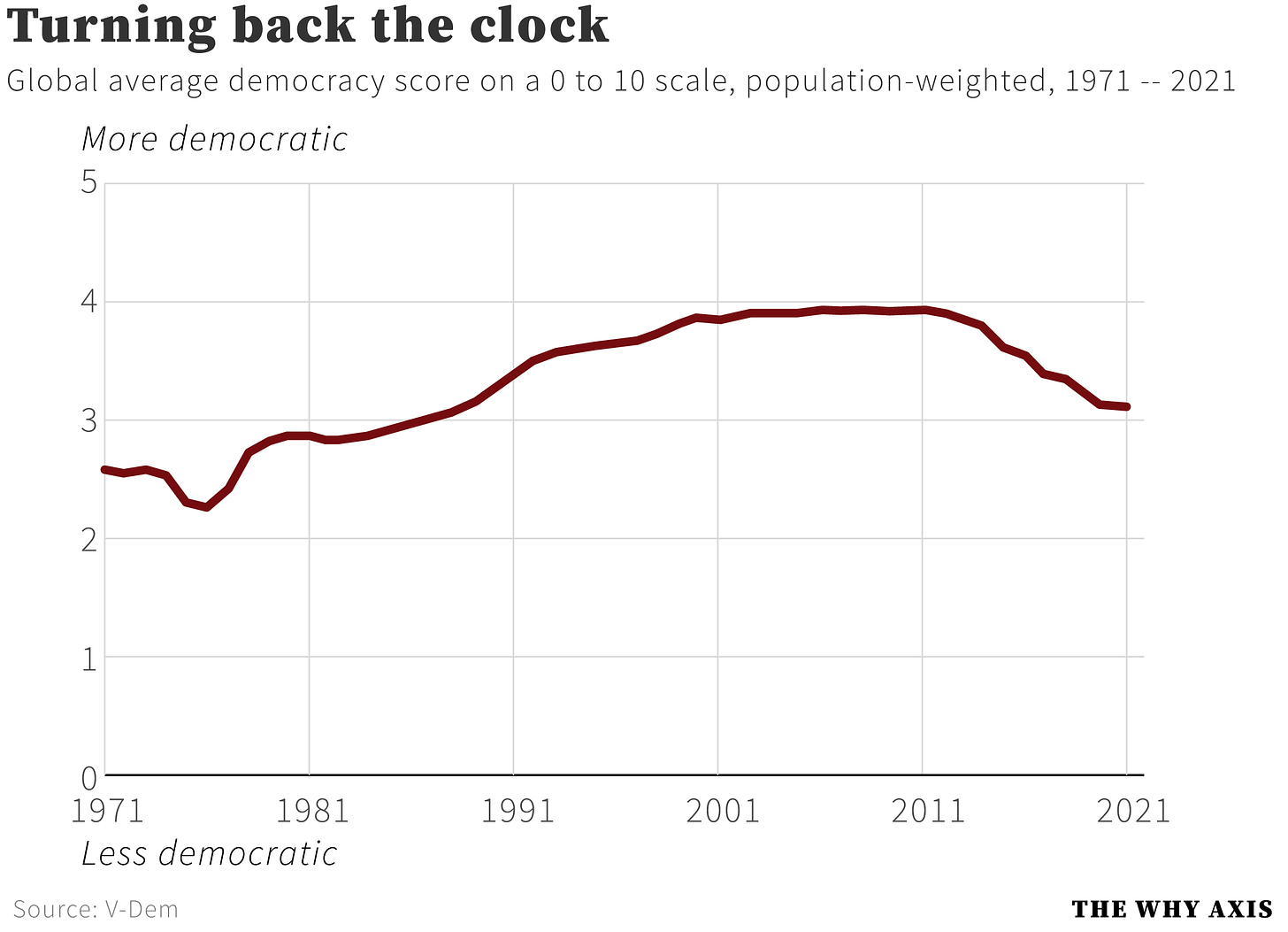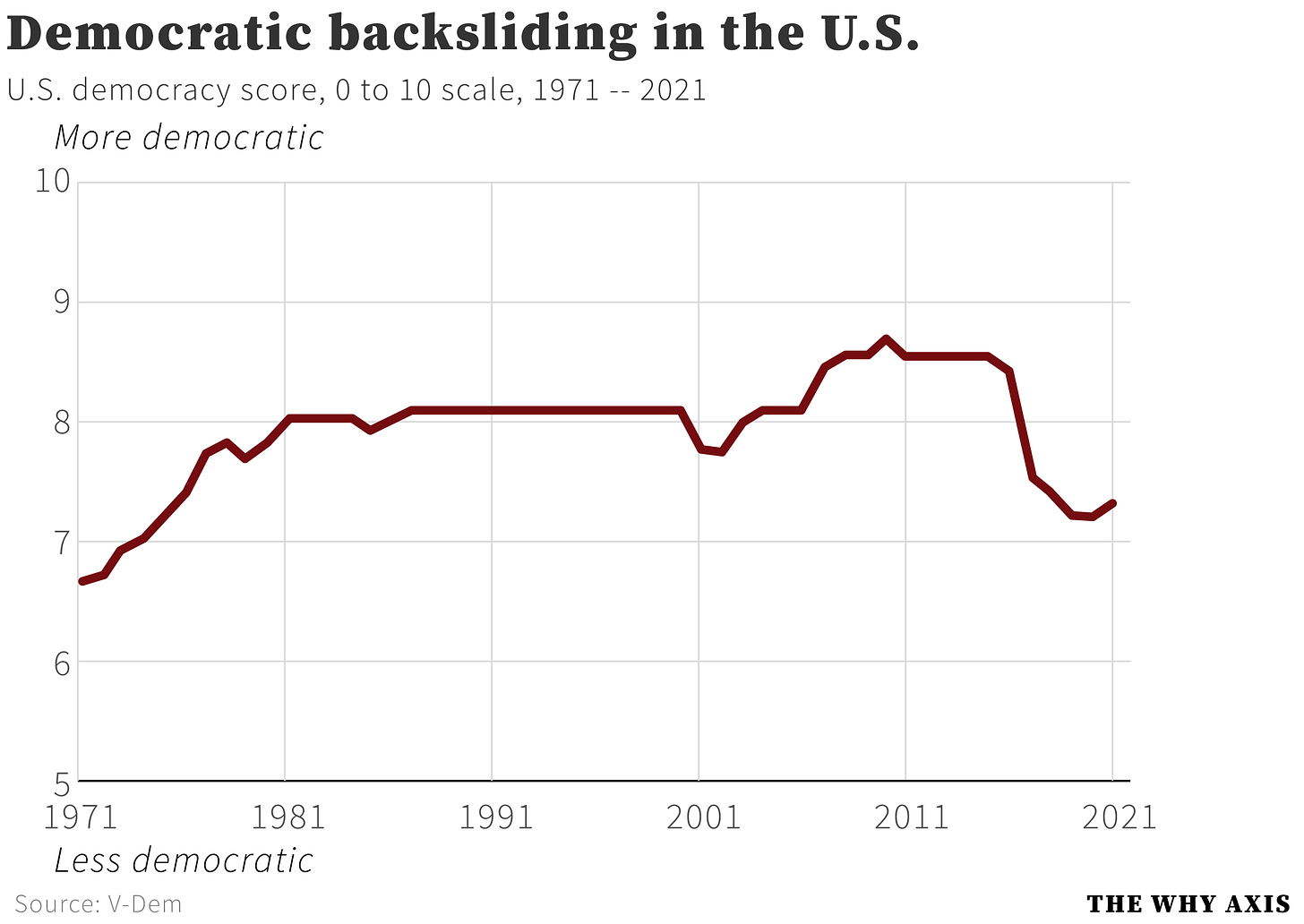“The last 30 years of democratic advances are now eradicated.”
That’s one of the opening lines of the latest report on global democracy from the V-Dem Institute, an academic group working to quantify and track the health of civil society in every country on the globe. A decades-long march toward greater liberties and democratic participation stalled in the first decade of the 2000s and has since reversed course, meaning the average citizen of Earth now enjoys the same amount of freedom as one living in 1989, before the Berlin Wall fell.
Over the past 10 years the share of the global population living under dictatorship rose steeply, from 49 percent in 2011 to 70 percent today. Thirty-three countries — home to 2.8 billion people — are backsliding toward autocracy. Just 15 nations are becoming more democratic, down from more than 70 at the dawn of the 21st century.
The report’s authors note that these figures reflect the state of the world before Russia launched a war of aggression against neighboring Ukraine, and that the architect of that war, Vladimir Putin, is directly responsible for setting off the wave of democratic backsliding that began in eastern Europe twenty years ago.
But backsliding is no longer just a problem in other parts of the world. Here in the United States, the ascension of Donald Trump triggered the steepest decline in democratic values in at least a century. The former president whose authoritarian impulses resulted in an unprecedented two impeachment votes still commands cultish devotion within a Republican party that’s now working across the country, at all levels of government, to undermine the independence of election boards, make it harder for their perceived enemies to vote, and place draconian restrictions on speech in public schools. While the election of Joe Biden has halted, for the time being, the erosion of America’s democracy rating, it has not reversed the decline in any meaningful way.
The report’s authors note that one of the most troubling trends in the United States right now is the toxic political environment. On a scale running from 0 to 4, where 0 represents civil disagreement and 4 represents open hostility, American political discourse currently rates a score of 3.93. Twenty years ago that same score stood at less than two.
“Political polarization is a division of society into Us versus Them camps whose members hold negative views of and distrust the other group,” the authors write. “When such camps align with mutually exclusive identities and interests, it undermines social cohesion and political stability.”
The lion’s share of that polarization has been driven by the Republican party’s hard right turn in the past several decades. As the Pew Research Center recently reported, while both major parties have moved away from the political center, the GOP’s lurch to the right is about three times larger than the Democratic party’s move to the left, according to a widely-used measure of partisanship.
Previous work by the V-Dem Institute has traced how the American Republican party has retreated from small-d democratic ideals in recent years, and now bears more similarity to authoritarian parties in places like Hungary, Turkey and Russia than it does to conservative parties in healthy democracies. The party has grown more comfortable with violence in the service of political ends, as evidenced by the ongoing work to lionize the the criminals who invaded the Capitol on January 6, 2021. Party leaders — Trump chief among them — routinely demonize opponents and disfavored minorities, mainlining racism and white supremacy into day-to-day political discourse. The party is now openly contemptuous of scientific consensus, resulting in widespread preventable death in Republican-voting areas of the country.
Despite all of this, the current national mood of discontent means the Democratic party is poised to lose control of the House and Senate this year, followed by the White House in 2024. Watchdogs warn that the abuses of power under a second Trump term will dwarf anything we saw in the first, following a well-established pattern seen elsewhere: failed authoritarian power grabs are often followed by successful ones.
That’s the most unsettling lesson of V-Dem’s research: that the United States isn’t unique, and that the pattern of democratic backsliding we’re living through right now has happened over and over again in other countries throughout history.






I can't really "like" this, but I appreciate the article. Very informative. And depressing.